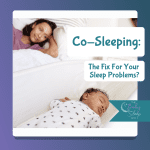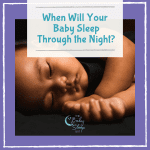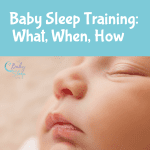
Is it a bad idea to rock your baby to sleep? It depends. It is never a bad idea to cuddle your baby and give them lots of love and affection! It’s only when rocking your baby becomes something you can’t keep up with that it can be a problem. Let’s take a step back and let me explain what a baby sleep association is.
In This Article:
- What are Your Sleep Associations?
- What are Your Baby’s Sleep Associations?
- Can Rocking Your Baby To Sleep Be Harmful?
- Types of Sleep Associations That Cause Sleep Problems
- Types of Sleep Associations That Help Babies Sleep
- What Age Do Babies Form Sleep Associations?
- How Do You Change Baby Sleep Associations?
- Do Babies Outgrow Sleep Associations Naturally?
What Are Your Sleep Associations? How Do You Fall Asleep?
What kind of routine do you do before you go to sleep each night? Do you brush your teeth and wash your face? Do you read or watch TV? Talk to your partner?
Tell me, do you sleep on a pillow or use a blanket?
These are the types of things you associate with going to sleep each night. What would happen if your power was out and you couldn’t watch the news or read your book? Would you have trouble falling asleep? Perhaps. Or, perhaps not.
Would you have trouble going to sleep without your pillow?
That might be more likely to give you trouble. Some sleep associations are stronger than others.
And, what if you went to sleep with your pillow and covers, and a few hours later, you woke up and they were GONE!? Would you be able to go back to sleep without looking for the pillow? Now let’s look at how this concept of sleep associations might affect your baby or toddler.
What Are Your Baby’s Sleep Associations? How Does Your Baby or Toddler Fall Asleep?
Baby sleep associations are things your baby expects as they fall asleep. And, the potential problem with sleep associations lies in the fact that your baby might need YOU to recreate the environment in which they fell asleep.
YOU become their “pillow” and when they wake up through sleep transitions (that we ALL have!) and their “pillow” is gone, they don’t know how to go back to sleep.
So, the key is to have your baby go to sleep the same way they will wake up periodically throughout the night between sleep cycles. If they wake up briefly and you’ve “disappeared” or the movement has stopped (as with my son) or their pacifier is gone or…they will wake up more and have to call out to you so you can “help” them once again. The beauty of this is that after they get to be about 4 months old, they really don’t “need” you as much as you might think and they can learn to fall asleep on their own if they haven’t learned already up to this point.
Can Rocking Your Baby Be Harmful?
I want to assure you that rocking your baby, using a pacifier, nursing, or offering a bottle before bed, etc. are NOT bad things to do! If you don’t mind rocking your baby for 10 minutes, they fall asleep, you transfer them to their bed and they sleep all night, then there is no problem. Is there?
It’s only when you can’t keep up with your baby’s sleep association that it becomes a problem. Keep in mind that your sleep fragmentation that makes you exhausted is no better for your baby than it is for you. If you are irritable, your baby might be fussy, too!
I would have LOVED to rock my son to sleep all the time and boy did I try (unintentionally — just in my nature)! We slipped back into bad habits more times than I wanted to count, but it just became a hitch for him EVERY time! In the end, I was able to continue to nurse him to sleep once he learned the necessary skills to go BACK to sleep throughout the rest of the night.
With opportunity and practice, we can all learn a new way to sleep, even without a pillow!
Types of Sleep Associations That Cause Problems For Babies
I like to stay away from the terms “good sleep association” versus “bad sleep association.” We simply want to find the “right” sleep associations for your baby just as you need to find the right one for YOU! And, your sleep associations might not work for me.
Here are the most common baby sleep associations that often cause sleep problems such as frequent night-waking and short naps:
- Rocking in a caretaker’s arms
- Bouncing on a yoga ball
- Walking in a stroller
- Driving in a car
- Sleeping in a Swing
- Breastfeeding all the way to sleep
- Sucking on a bottle to sleep
- Sucking on a pacifier to sleep (if they spit it out and can’t/won’t put it back in)
- Being held for long periods of time by a caretaker
- Being swaddled past when the Moro reflex goes away
- Co-sleeping and Bed-sharing (if not intentional)
Anything that needs to be repeated to help your baby get to the next sleep cycle can become a sleep problem.
Types of Sleep Associations That Help Babies Sleep
And, here are sleep associations that often HELP babies sleep better!
- Room-Darkening Blinds or Curtains
- White Noise
- A sleep sack or Zipadee-Zip
- A pacifier (if they can maneuver it or don’t need it 100% of the time)
- A lovey
- Sucking on their thumb or fingers
- Rocking back and forth (on their own), humming, or babbling
You’d be surprised at some of the things babies and toddlers do to self-soothe. Some self-soothing is downright weird!
What Age Do Babies Form Sleep Associations?
Most babies form sleep associations when they turn 4 months old and the main reason the 4 month sleep regression is such a headache! There are some babies, like mine, who seem to come out with sleep associations or they form before 2 or 3 months old.
How Do You Change Baby Sleep Associations?
Changing baby sleep associations is not always an easy task but you’d be helping your baby create healthy sleep habits from a very young age! We all could use better sleep in our lives. Here are my tips for changing sleep associations:
- Create a Bedtime Routine to set the stage for sleep
- Make sure you have an age-appropriate sleep schedule
- Put your baby down drowsy, but awake
- Do sleep training – there are gentle sleep training methods or faster ones that involve more crying such as The Ferber Method
- Be consistent
Keep in mind that during sleep regressions, your baby may revert back and you’ll need to change them again!
Do Babies Outgrow Sleep Associations Naturally?
Yes! Eventually, all babies outgrow their sleep associations that involve parents. After all, no one graduates high school being rocked to sleep, do they?
So, the real question is WHEN will babies outgrow sleep associations that involve parents?
Sometimes, babies don’t make any changes until their parents encourage them. After all, we encourage good manners at the table, not to play with an outlet, and to try new foods. How long would it take for a baby to try baby food made with broccoli if we didn’t encourage it? That’s where our guidance comes in.
As a sleep consultant for over 15 years, I can tell you I’ve seen babies naturally become better sleepers at 6 months, 12 months, 2 years old, and everything in between. But, I’ve also worked with countless parents of babies of ALL ages who were waiting for their baby to outgrow their sleep problems! I’ve worked with newborns and 4-year-olds moving to their own beds. It can mean many hours of lost sleep for months, and even years, for both of you so I always say to be proactive. Even if you don’t get “perfect” sleep, it doesn’t mean you can’t have better sleep!








